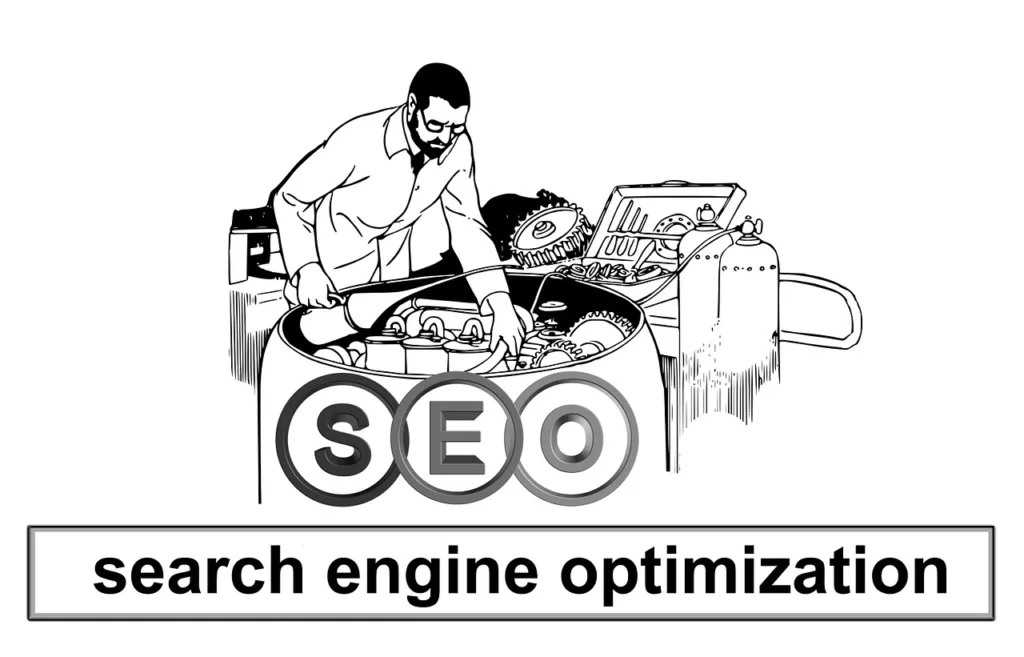
Search Engine Optimization (SEO) is a critical factor in determining a website’s exposure and success in the wide world of the internet. Search engine optimization is a strategic procedure that involves matching various parts of a website with search engine algorithms to improve its online presence. To put it simply, SEO seeks to raise a website’s position for pertinent keywords on search engine results pages (SERPs), which increases organic traffic.
In this post, we will examine the complexities of SEO, including its importance, how it affects website owners’ ability to generate revenue, important ranking elements, and, in the end, what makes this digital marketing tactic tick.
Prior to search engine optimization, advertising had to be done offline. We distributed business cards and pamphlets door-to-door. Or we posted our proposals on a billboard that we rented. Fortunately for internet consumers, SEO allows us to notify the public about deals and promotions. What else could we accomplish if we didn’t have access to the internet? All you have to do is create a beautiful, pertinent website about goods or services that people frequently look for, then utilize search engine optimization to spread the word about them.
Search Engine Optimization (SEO)
To make sure that a website is easily found by search engines and, subsequently, by visitors looking for relevant content, SEO entails a variety of methods. It includes technical SEO, off-page optimization, and on-page optimization. While off-page optimization entails creating external links and boosting an online presence via social media and other platforms, on-page optimization concentrates on improving content, meta tags, and keyword placement within a website. Technical SEO takes care of the backend features, like site structure, mobile compatibility, and speed. Better search engine rankings are a result of these components working together harmoniously.
Search engine optimization is used when someone uses Google to look up a resolution or an answer to their question. For almost any search query, there are endless websites mentioned in search engine optimization. These websites are meant to provide answers and solutions, by millions of website owners, pertaining to the search query.
The goal of SEO is to assist brands in offering a range of deals or promotions to the millions of consumers who use the internet to search for solutions or answers to their problems. You must have a website with content relevant to people’s searches if you want to employ SEO. For example, if many people are searching the internet for a nice Toro lawn mower, they will google “nice Toro lawn mower or Toro lawn mower.” They will use Google to locate deals or details and features about Toro lawn mowers. Subsequently, a plethora of diverse outcomes surface, featuring webpages that offer details about Toro lawn mowers.
Do Website Owners Earn Revenue?
As part of the SEO process, do website owners earn revenue for providing helpful solutions? They certainly can earn revenue by providing affiliate links to their websites, directing the viewer to the related solution or answer to their query. Revenue growth for website owners is one of the most appealing features of SEO. Increased visibility from higher search engine results draws more users to the website. Both companies and consumers can benefit from the surge of organic traffic by converting website visitors into consumers or clients with an efficient website. The increased visibility also makes possible joint ventures, relationships, and advertising opportunities more accessible, which increases revenue and generates even more income.

Many factors are involved in order for website owners to earn from SEO traffic:
- They must rank well on Google. The fewer pages the viewer has to search for something, the better their chances are for website owners to get found and possibly clicks. Viewers, like myself, generally do not like to spend a lot of their time searching page after page to find an answer or solution to their query. So, if your website is either listed on the first or second page, you will stand a better chance of getting clicks and possible opt-ins or sales. Our goal is to get listed on the first page of Google. In order for that to happen, we need an appealing website and articles with helpful content, directing links, and overall a great user experience.
- Your article must have good content related to its title and purpose. Your content should contain a variety of relevant details leading up to the solution or answer to the viewer’s problem.
- It is important to have good keywords for the title of your article. Without good keywords, you stand a lower chance of ranking in the search engines. You must do keyword research to create a good keyword. Your article is supposed to directly answer the viewer’s question. Having great relative keywords for your title is the most important concept for getting more traffic to your website.
- The niche you choose to write about can influence whether you will earn revenue or not. Some niches are not in high demand or are not in demand at all. So the niches with the least demand or no demand will very unlikely get any views or clicks. Therefore, you stand very little or no chance of success with affiliate marketing. So always do some research to determine if there are a large number of viewers looking for information regarding your niche.
Other SEO Ranking Factors
Knowing the main ranking elements that search engines take into account when judging a website’s relevancy and authority is crucial to understanding the workings of SEO. These elements include the level of quality and applicability of the content, the general user experience of the website, the quantity and value of backlinks, the site’s speed, mobile friendliness, and technological features like secure HTTPS connections. By understanding these ranking variables, website owners can improve their online visibility and move up the search results page.
There are some other factors to consider in ranking in the search engines. A good-quality article is dependable for ranking. Is your content structured well? What about your grammar? Is your topic or the main idea of your article coherent with the content and its purpose? Having good content will not only help you rank better but will also attract other websites to link to your website, therefore improving your chances of earning revenue.
Adding external links to your web page will improve your search engine ranking. This attracts more users to your website and even increases the likelihood that search engines may use links from other internet pages that are relevant to your blog or article. It provides your viewers with additional information and reliable references beyond what you have provided in your article. It extends your visitors’ time on your website as well.
Have you ever searched for an article on your computer and it took forever for it to load? I’m talking about the speed at which a page loads. Someone would undoubtedly give up and visit other websites if they had to wait 50 seconds, 2 minutes, or 5 minutes for the content to load on their screen. The ideal loading time should be no longer than three seconds, at the very least. People need data quickly. Thus, one of the most significant elements in ranking is loading speed.
User friendliness and ranking are impacted by mobile friendliness. Nowadays, the majority of individuals always carry a smartphone. As a result, mobile device users may account for a larger portion of your audience than desktop computer users. Thus, always double-check your content on both your phone and your computer after finishing it. Your content—images, charts, videos, etc.—should be visible on both your desktop and mobile devices.
Other factors to consider in the S.E.O. ranking are:
- keyword phrase usage
- social media ties (Facebook, Instagram, or Twitter)
- Keyword metrics
- user experience
If you are looking to learn more about ranking in the search engines, you can go to Wikipedia for more information. If you would like more extensive information about search engine optimization, you can go to Google Search Central.
Conclusion:
To sum up, SEO is a vital component of digital marketing that gives website owners a powerful tool to improve exposure, draw in organic visitors, and eventually boost sales. Website owners may dominate search engine results pages and traverse the competitive online world by grasping the specifics of on-page, off-page, and technical optimization. Effective SEO techniques are still essential for anyone hoping to succeed long-term in the huge and ever-changing internet space as the digital world develops.
The practice of search engine optimization has been ongoing for a very long time. Advertisers can now publish articles with offers on their websites more easily, making it easier for users searching to find solutions or answers to simple queries.
You, as a website owner, must abide by the stated rules in order to put articles in the listings and be ranked. Links, relative content, keywords, and other elements are crucial for search engine optimization success. There is a great and popular training program called Wealthy Affiliate that will teach and train you about using SEO for online marketing. You can research Wealthy Affiliate and register for a FREE starters account if you’d like to learn more about search engine optimization and affiliate marketing. To rank your post or website in the search engines, you will need to go through their training accurately and apply yourself, moving from one lesson to the next.
I hope you have gotten a good amount of valued information from this post. Thank you for visiting my website and posts. Please feel free to post your questions below this article.
Gerald W

“Here’s a little transparency: Our website contains affiliate links. This means if you click and make a purchase, we may receive a small commission. Don’t worry, there’s no extra cost to you. It’s a simple way you can support our mission to bring you quality content.”

